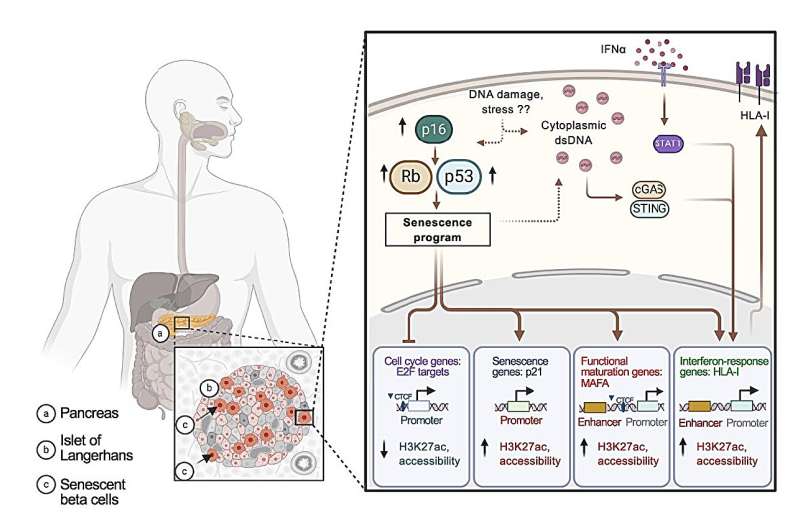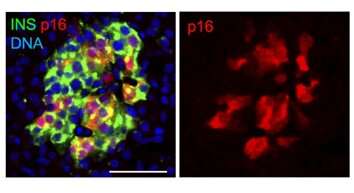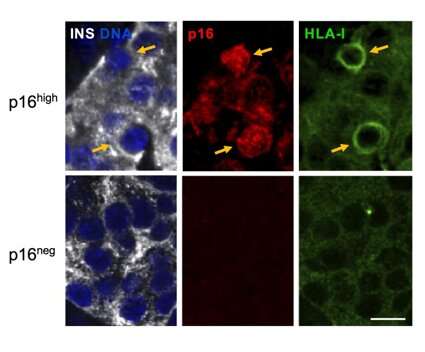
A new study reveals that aging human pancreatic beta cells display features of senescence while maintaining elevated levels of genes crucial for their function. Despite their aging status, these cells therefore exhibit an ability to release insulin in response to glucose, aiding in blood sugar regulation.
Additionally, these aged cells show increased activity of genes that can stimulate the immune system. This sheds light on the potential role of aging beta cells in immune regulation and their relevance to autoimmune reactions in type 1 diabetes.
The study, led by Dr. Milan Patra along with Professors Ittai Ben-Porath and Yuval Dor from the Faculty of Medicine of the Hebrew University, is published in Nucleic Acids Research.
The diabetes challenge
Diabetes, characterized by insulin deficiency or resistance, hinges on dysfunctional pancreatic beta cells, which are responsible for secreting insulin to remove glucose from the blood. Enhancing or preserving the function of these cells is pivotal for developing diabetes treatments.
Globally, an estimated 463 million adults, or roughly 1 in 11, grapple with this condition, a figure expected to balloon due to aging populations, urbanization, poor diets, and sedentary lifestyles. Projections indicate that by 2045, over 700 million could be afflicted, posing daunting challenges to health care, economies, and public health efforts. Urgent action is imperative to stem this tide, necessitating effective prevention strategies, better access to care, and innovative treatments.

Functionality and immune response
The study demonstrates that a significant portion of adult human pancreatic beta cells activate a gene called p16, which indicates that they are in an aging-like state, termed cellular senescence. Interestingly, these senescent cells, rather than showing signs of dysfunctionality, show elevated levels of genes that are important for their function.
Thus, these cells appear to possess a higher level of functionality and maturity compared to their non-senescent neighbors. This is surprising, as previously identified senescent cells in other tissues are generally thought to be dysfunctional and have harmful effects.
By analyzing the gene organization of senescent beta cells, the researchers discovered that they change the packaging of the genes—the chromatin, generating a reprogrammed organization that allows activation of functionality. Because of this, it appears that the aging beta cells have the ability to release insulin in response to glucose in even larger amounts, which helps regulate blood sugar levels effectively.
This study also found that senescent beta cells have elevated levels of genes that communicate with the immune system. This response, termed the “interferon response” normally acts to indicate a viral infection to immune cells, recruiting their attack. However, the senescence beta cells activate this pathway in the absence of such infection: it is molecular changes in the cells themselves simulate this response.
The potential consequence is increased stimulation of immune cells to attack beta cells, the fundamental process that drives type I diabetes. This means that aging beta cells might help regulate immune responses and could be important for understanding autoimmune reactions in type 1 diabetes. Potentially, blocking this response, or the process of senescence, could be used to prevent the progression of type I diabetes in its early stages.

Implications for diabetes treatment
The discovery that aging pancreatic beta cells can retain high functionality and respond to immune signals challenges the traditional view that senescent cells are purely detrimental. This new understanding opens the door to potential therapies aimed at preserving or enhancing the insulin-secreting function of beta cells in diabetic patients.
“These findings are pivotal because they suggest that senescent beta cells are not a liability, but may act, in a pre-designed manner, to improve insulin production as we age, countering other detrimental effects,” said Professor Ittai Ben Porath. “Furthermore, if it will be further established that senescence of beta cells is a prominent feature of the early stages of type I diabetes, targeting of these cells through drug treatment could represent a novel approach for preventing autoimmune attack of beta cells.”
Future research plans include delving deeper into the mechanisms driving the increased activity of functional-maturation programs in aging beta cells, influenced by chromatin dynamics. A comprehensive understanding of these processes holds promise for the development of targeted therapies aimed at enhancing beta-cell functionality and lifespan, thereby improving the quality of life for individuals grappling with diabetes. Understanding how the process of senescence affects the interaction of immune cells with beta cells, and whether this is indeed associated with diabetes, may open the door for new treatment approaches.
More information:
Milan Patra et al, Senescence of human pancreatic beta cells enhances functional maturation through chromatin reorganization and promotes interferon responsiveness, Nucleic Acids Research (2024). DOI: 10.1093/nar/gkae313
Citation:
Researchers reveal secrets of aging beta cells and their ability to secrete insulin (2024, June 4)
retrieved 4 June 2024
from https://medicalxpress.com/news/2024-06-reveal-secrets-aging-beta-cells.html
This document is subject to copyright. Apart from any fair dealing for the purpose of private study or research, no
part may be reproduced without the written permission. The content is provided for information purposes only.
